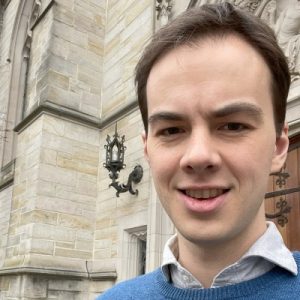Professor William Theiss is another brilliant new faculty addition to the UConn History Department at the Campus. His specialty areas include
Early modern Europe, Renaissance and Reformation Germany, and the Holy Roman Empire.
In this interview, he explores the foundation of his current research, his inspirations, and what excites him about joining the department.
What are your research interests? What inspired you to pursue these topics?
My research is about the history of the Holy Roman Empire and, in particular, its villages. For ten centuries, this political organization was a puzzle, an anachronism, and even an embarrassment on the map of Central Europe. But after it was dissolved in 1806, it lingered as a kind of ghost and seems to have influenced much of the modern history of the region, including many of the greatest tragedies of human history. So I ask: How did ordinary villages endure this transition? How did the villagers of premodern Central Europe become the subjects of modern states?
I try to answer these questions by studying their books. Every church in the Holy Roman Empire kept a “book of names,” or a Kirchenbuch, and for me these sacred manuscripts are the key for understanding the transmission of communal memory, the continuity of history, and the transition from an old empire to modern bureaucratic states.
Historians used to imagine that illiterate communities in European history were like black boxes. We could speculate about them; we could apply sociological laws to them. We could study them in the abstract, but not in their infinite specificity. I’m inspired by the opposite idea. Opening up the libraries of premodern churches across what is now mostly Germany and Czechia, we are actually greeted by a whole chorus of different voices trying to tell us their stories. I see this as a vast project of recovery and historical salvage.
What drew you to UConn? What excites you about working in the UConn History department?
Working at UConn is an enormous privilege. What drew me to UConn, initially, was its excellence in basically every arena in which a modern university can excel. The traditions of research here go back over a hundred years (there are some very big shoes to fill). The university is still expanding into new kinds of knowledge and is at the very front of experimentation in the humanities. But what excites me most, after beginning to work here, are the students. I already knew that UConn students were some of the best in the United States and the world, and what I’ve found is just that: they are curious and politically engaged and they listen to each other.
What are your teaching interests?
I love teaching the early modern period, both as global history and as European history. The period 1200-1800 shows a world coming into being in a form that we recognize as modern, but not quite; this ambivalence makes it especially fascinating to explore with students. We often find that religious traditions, geopolitical rivalries, and political formations that emerged in this period matter to us still today—sometimes all too clearly —and they help to explain our own world.
What projects are you currently working on?
I’m working on a monograph based on my doctoral dissertation, which is now, tentatively, called The Book of Names. I’m also working on a new history of the revival of Stoicism in early modern Europe, with a focus on Germany and the Netherlands. We see, even today, that an atmosphere of political crisis and ambient anxiety coincides with the popularity of the philosophical practice known as Stoicism. Why is that? Why was that also the case in the period known as the ‘late Renaissance’? Those are some of my basic questions.
What led you to become a historian?
I have more inspirations than I could possibly name, and I feel strongly about all of them. Studying history is a strange thing: in theory it’s dedicated to the past, and often to a past so distant that all of one’s subjects are dead. But in practice it is entirely made up of the relationships we have with people in our lives: our families, our mentors, our teachers and students, our friends and colleagues. My own interest in the history of religious life, village life, and Central Europe comes from my grandmother and my great uncle and the stories they told of earlier generations.
Meanwhile my specific approaches and choices of subject are inspired by some of the brilliant teachers of language, history, and literature I was lucky enough to encounter as an undergraduate and graduate student. Important also were relationships I formed with scholars in Leipzig and Halle, Germany, where I partially studied for my PhD and where I did a lot of my dissertation research. And finally they were formed by the tips and tricks given to me, like bread crumbs, by archivists across Europe. This is one thing I was surprised to learn: history seems like a solitary enterprise, but in fact I am only the sum of the many generous people who have lent me their time, ideas, and stories.
What are you reading right now?
Oh, too much. Carla Roth’s great new book, The Talk of the Town. The last chapter of the second volume of Stephen Kotkin’s biography of Joseph Stalin, this one called Waiting for Hitler. Diane Johnson’s classic feminist book on Victorian literature, The True History of the First Mrs. Meredith and Other Lesser Lives. And I’m trying to read the Dutch novelist J. J. Voskuil’s novel about an academic office, Het Bureau. It’s great company when adjusting, happily, to life in a new department.